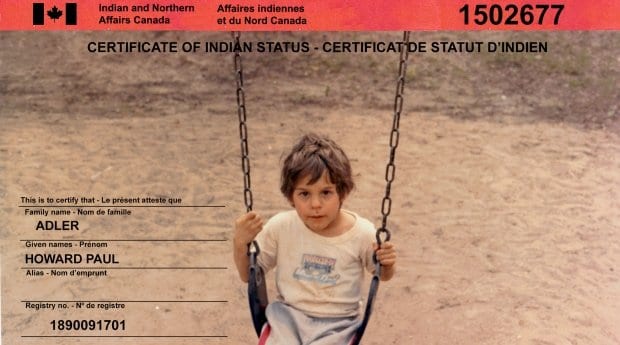Howard Adler’s short film, Status.
Youtube
Howard Adler is not a number. He’s a person with a family, a job, passions — he’s an accomplished artist — and has the photos to prove it. He identifies as a two-spirit and Jewish and Ojibwa person. But in the case of the latter it’s the Canadian government who decides whether or not he counts as an “Indian” and then assigns him with a number.
His number appears on his Status Card, the Canadian government-issued identification for people who qualify as Status Indians under the Indian Act.
It’s a system that makes him very uncomfortable. “The government decides who has status and who doesn’t, based on blood. The person isn’t allowed to determine their own identity,” he says. “Having a number like that, that is specifically about race, it’s very racist.”
He also considers it dehumanizing — each Indian Act-approved indigenous person getting a number. So, he’s getting some redress. He raided his family albums for endearing pictures of himself and his mother and siblings when they were kids, called everyone up for their status number and created a series of posters.
“They look like Status Cards, but instead of the usual background, you see a photo of the person alongside their name and status number,” he says. “It contrasts those two things — government labelling and how families actually document themselves — in a dramatic way. It shows that indigenous people are people, not just numbers.”
The poster series, called Status, will exhibit at Venus Envy for much of the latter part of April.
He also created a short documentary film, also called Status, which includes the personal stories of various people, providing a more in-depth look at the Status Card system’s problems. It screened in 2014 on CBC.
But instead of screening this film — which can be found easily online — alongside his posters during the exhibit’s opening night, he’s screening another short film, Kent Monkman’s Miss Chief: Justice of the Peace. It documents a performance that Monkman’s drag alter ego, Miss Chief Eagle Testickle, put on in 2013 in Washington, DC.
“He’s a person of Cree descent and his work covers a lot of the same ground as mine, deconstructing issues like tribal enrolment and race-based classifications,” Adler says. “My work is a bit more serious, and his is funny, so I thought it’d be nice to combine them.”
Status opens Fri, April 10, 8:30pm; runs until Thurs, April 30, at Venus Envy, 226 Bank St, Ottawa
venusenvy.ca


 Why you can trust Xtra
Why you can trust Xtra


